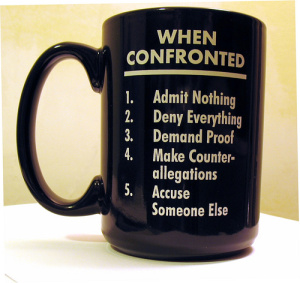 I consider myself quite aware, quite present, and yet… I am still finding out stuff that I have had no idea about.
I consider myself quite aware, quite present, and yet… I am still finding out stuff that I have had no idea about.
Your attitude, more often than not, comes as a mirror of your “opponent’s”… partner’s, “the other”.
One of the automatic behaviors happens without any thinking on our part: mirroring.
It is one of those phenomena when you act and then justify it later.
Example: I called on a participant yesterday, or was it on Monday?
I found myself tensing up, I found myself arguing.
The difference between you and me, is that I caught myself. What tipped me off is that I had no reason to be confronted, or confrontational. I was at peace about the topic, about the participant, about life. So suddenly hearing myself arguing was a dead giveaway. I was mirroring the participant’s attitude. She was distressed about a decision of mine… and she was attacking.
I was mirroring the participant’s attitude. She was distressed about a decision of mine… and she was attacking.
Did SHE know it? No. She is, like most of you, unaware of her own attitudes, because they seem so justified, they don’t seem to belong to her, when she looks.
If something makes you angry, you don’t even consider that your attitude is angry.
 One of the most memorable moments of a movie, any movie, was the conversation the character played by Bob Thornton in Sling Blade with the student journalists.
One of the most memorable moments of a movie, any movie, was the conversation the character played by Bob Thornton in Sling Blade with the student journalists.
The students ask: Will you kill again? (Thornton is at the end of his 30 year sentence for double homicide.)
Thornton: I don’t reckon 1 I have any reason to kill.
This is where you know that once he has a reason, he will kill.
He is a retarded man with no sense of the immorality of killing. He has a reason — he kills.
 You are the same way with your attitude: you have a reason to be angry — you assume an angry attitude.
You are the same way with your attitude: you have a reason to be angry — you assume an angry attitude.
You have a reason to feel superior — you assume a superior attitude.
You have a reason to be happy — you assume a happy attitude.
The difference between a human and a human being is many, but the most important difference is that the human being, as a rule, takes on being responsible for what he can be responsible for.
A human being is cause… a human is mostly effect.
When you have any “because”, it prevents you from “being cause” or “be cause”.
No circumstance is good enough for a human being to give up being cause. Injustice, injury, good luck, back luck, the human being chooses the attitude by who he is, and by what will work.
I seem angry from time to time. If you were an empath, you would know that there are no vital signs of anger there: I decide that angry is the way to go… I am not a victim of my impulses… or not often.
I still need to conquer discouraged, and some other attitudes, but I am getting there… slowly. It takes work, by the way.
Now, why am I sharing this with you?
 Your life seems to me like the life of a pinball. Your successes, your failures, the moods and behavior of other people’s behavior, the traffic, the weather, your weight, your health all seem to take you out of your equilibrium, out of being cause in your life.
Your life seems to me like the life of a pinball. Your successes, your failures, the moods and behavior of other people’s behavior, the traffic, the weather, your weight, your health all seem to take you out of your equilibrium, out of being cause in your life.
You must be exhausted!
Consider that many of those emotional states are mere mirroring of other people’s, not yours at all.
Consider that many of those situations are not personal, and any emotion, any attitude you put there, won’t change them… it is what it is. Cold, pink, striped, congested, whatever….
I seem most vulnerable to people who seem to attack. I get swept up. Why? Maybe because I was beaten as a child? Who knows. Who cares? I prefer to stay calm and collected no matter what another person’s attitude is.
Attacking people, by the way, feel weak, feel powerless, that’s why they attack. Breathe, and control your attitude.
 Someone is trying to intimidate you? Breathe… You cannot control the fear, but you can control the attitude… you’ve always responded by becoming meek? Did it work? No, right? So be sweet and understanding instead. That will confuse the heck out of the intimidator… lol.
Someone is trying to intimidate you? Breathe… You cannot control the fear, but you can control the attitude… you’ve always responded by becoming meek? Did it work? No, right? So be sweet and understanding instead. That will confuse the heck out of the intimidator… lol.
After all, this is YOUR life, and why would you want to hand over the controls to anyone?
- reck·on
?rek?n/
verb
verb: reckon; 3rd person present: reckons; past tense: reckoned; past participle: reckoned; gerund or present participle: reckoning1.
establish by counting or calculation; calculate.
“his debts were reckoned at $300,000”
synonyms: calculate, compute, peg, work out, put a figure on, figure; More
count (up), add up, total;
tot up
“the cost was reckoned at $6,000”
include in (a class or group).
“in high school and college he was always reckoned among the brainiest”
synonyms: include, count, consider to be, regard as, look on as More
“Anselm reckoned Hugh among his friends”
2.
informal
conclude after calculation; be of the opinion.
“he reckons that the army should pull out entirely”
synonyms: believe, think, be of the opinion/view, be convinced, dare say, imagine, guess, suppose, consider, figure
